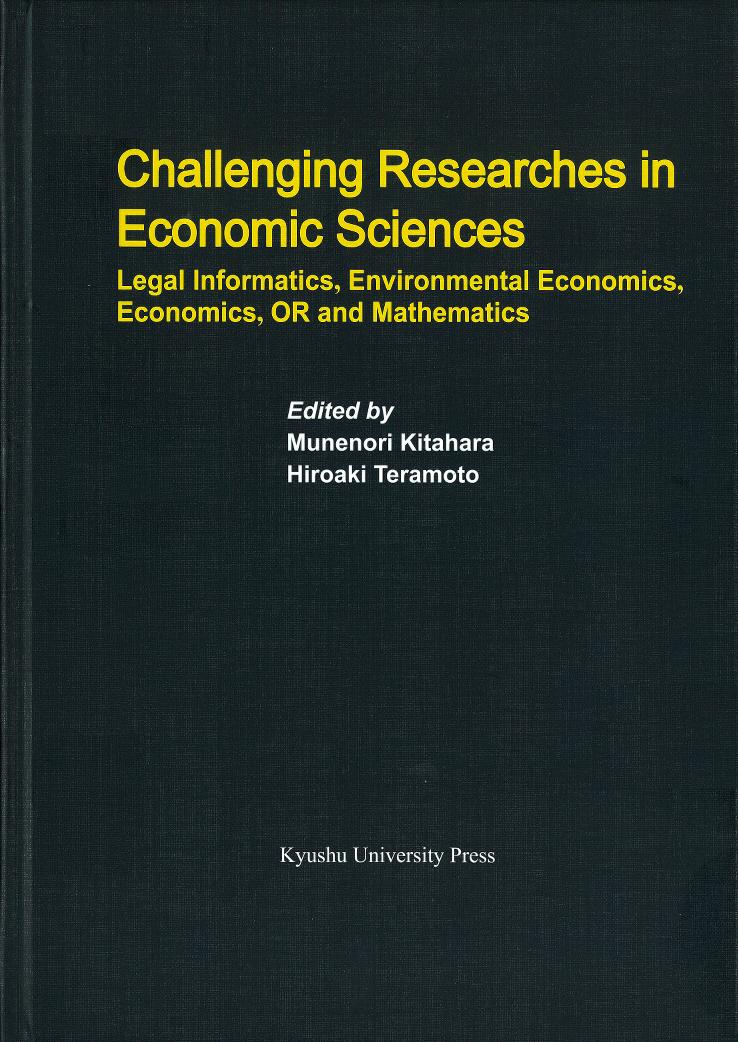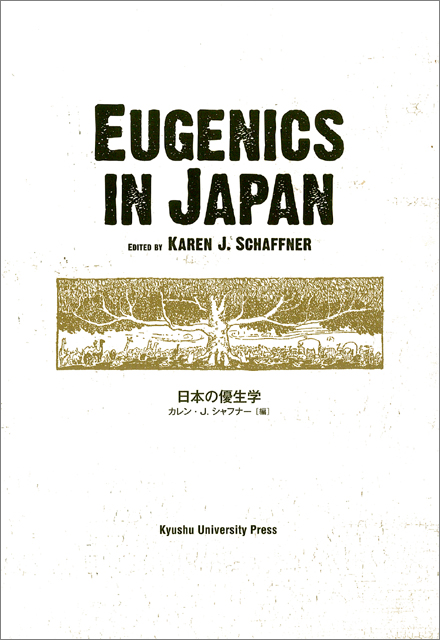- HOME >
- BOOKLIST >
- Social sciences>
- Challenging Researches in Economic Sciences
Challenging Researches in Economic Sciences Legal Informatics, Environmental Economics, Economics, OR and Mathematics
Introduction
information sciences, environmental economics, economic sciences, systems approach to the
economic, managerial, mathematical, environmental, and legal subjects. The focus of most
articles is on the recent developments in the relevant. The set of papers in this book reflect both each theory and wide range of applications to economic and managerial models. The economic sciences is based upon an interdisciplinary education and research area of sciences economics, econometrics, statistics, information sciences, system sciences, application information sciences, operations research and legal informatics.
JADE, the values of each parameter are generated according to one probability density function (PDF) which is learned by the values in success cases where the child is better than the parent. However, search performance might be improved by learning multiple PDFs for each parameter based on some characteristics of search points. In this study, search points are divided into plural groups according to some criteria and PDFs are learned by parameter values in success cases for each group. Objective values and distances from a reference point, which is the best search point or the centroid of search points, are adopted as the criteria. The effect of JADE with group-based learning is shown by solving thirteen benchmark problems.
Contents
Author
Munenori KITAHARA, Professor, Hiroshima Shudo University
Munenori Kitahara (LL.M) is Professor of legal informatics (Rechtsinformatik) at the Faculty of Economic Sciences and the Graduate School of Economic Sciences in Hiroshima Shudo University, Japan. He lectures “Research on Information Society,” “Legal Informatics,” and “Personal Data Protection Management System.” He was a guest professor at the Legal Informatics Institute of Hannover University in Germany (1999-2000).
He was a research member of legal expert systems (Legal Expert System Les-2, Lecture Note in Computer Science, No.264, Springer Verlag 1987). He is also a member of IVR. He presented several papers: “The Impact of the Computer on the Interpretation of Law (ARSP Beiheft 39, 1991), “Personal Data Processing and Business Ethics”(IVR 22nd World Congress, Granada, Spain 2005), “Ethics of Cyberspace: Information Ethics and Information Moral” (IVR 23rd World Congress, Krakow, Poland 2007), “The Right to Data Protection in Digital Society” (IVR 24th World Congress, Beijin, China 2009), “The Fusion of Law and Information Technology” and “Law and Technology Security Standard” (IVR 25th World Congress, Frankfurt am Main, Germany 2011), “The Information Society Law in Japan” (The 3rd International Seminar on Information Law 2010, Ionian University, Corfu, Greece). “The Information Society Law : The Fusion of Law and Information Technology” (The 5th International Conference on Information Law and Ethics 2012, Ionian University, Corfu). “Law and Technology: The Fusion of Law and Information Technology” and “Law and Technology: Legal Justice through Deploying Information Technology in Law” (IVR 26th World Congress, Belo Horizonte, Brazil 2013). He also published a paper titled “Legal Justice through the Fusion of Law and Information Technology” (Legal Informatics, Economic Science and Mathematical Research, Kyushu Univ. Press 2014). “Law and Technology: Regulations Compliance through Deploying Information Technology”(IVR 27th World Congress, Washington D.C. 2015). One of his latest researches is “Systematizing and Networking Information Society Law.” The legal system consists of twelve legal groups and some fifty acts which have been related to information, information devices and information networks. He also proposes networking the legal system, and the fusion of law and information technology. He is researching on realizing a legal justice through using information technology. Another is “propertization of personal information based on the ownership.”
Hiroaki TERAMOTO, Professor, Hiroshima Shudo University
He received his Master degree in Economics from Hitotsubashi University in 1972. Since 1989, he has been teaching Hiroshima Shudo University as a professor. His main teaching experiences include Modern Economics (1975~1997), Consumption Economics (1997~) at Hiroshima Shudo University. His special fields of study are consumer behavior and entrepreneur behavior. His major publications are as follows; “Productivity in Consumption The Application of Household Production Function Approach ”, Hitotsubashi Ronsou, 1986, Vol.95, №5, pp.661-676; “Intergenerational Transfer of Income and Wealth”, Keizai Kagaku Kenkyu, 1998, Vol.2, №1, pp.91-112; “External Effects of Consumption and Economic Development”, Keizai Kagaku Kenkyu, 2007, Vol.10, №2, pp.39-56; “The Economic Analysis of Altruistic Consumer Behavior”, in S. Hiraki and N. Chang (eds.), The New Viewpoints and New Solutions of Economic Sciences in the Information Society, Kyushu Univ. Press, 2011, pp.13-25; “Health and Consumer Behavior”, in M. Kitahara and H. Teramoto (eds.), Contemporary Works in Economic Sciences, Kyushu Univ. Press, 2016, pp.35-45.
Chris CZERKAWSKI, Professor, Hiroshima Shudo University
Professor of International Finance, Graduate School of Economic Sciences, Hiroshima Shudo University. Published in the area of International Capital Markets, Foreign Exchange Economics, Corporate Finance in journals in Japan, Australia and the USA.
Osamu KURIHARA, Professor, Hiroshima Kokusai Gakuin University
Osamu Kurihara was educated at Meiji Gakuin University, Hiroshima University and Hiroshima Shudo University, where he completed his PhD. He joined Hiroshima Kokusai Gakuin University as a Professor in 2006. He lectures Macroeconomics and International Economics in the University.
His research interests are Balance of Payments, Exchange rates and capital flows, currently and historically. He has been a director in Japan Academy for International Trade and Business from 2009.
Hiroshi HASEGAWA, Professor, Hiroshima Shudo University
He received his Master degree in Agricultural & Resource Economics from University of Hawaii in 1989, following under-graduate years in Tokyo University of Agriculture (1974-79) and Michigan State University (1977-78). He also obtained in 1996 nationally authorized license of Registered Professional Engineer in Rural Environment, based on his 21-year career including FAO associate expert (1983-85), JICA program officer (1989-1990) as well as international environmental consultant (1990-2002). In addition to teaching experience in Utsunomiya University (Environmental Economics, 2002-2005), he has been lecturing in Hiroshima Shudo University as a professor since 2002 (mainly on Environmental Impact Assessment, Economic Evaluation of Environment, and Environment & Politics/Administration). His special fields of study are environmental assessment and cost-benefit analysis of environmental projects. His major publications are as follows; Japanese version of “Economic Valuation Techniques for the Environment A Case Study Workbook ” edited by J. A. Dixon, Tsukiji Shokan, 1993; “Economic Assessment of Environmental Impacts”, Tokyo Shuppan, 1998; “Economic Evaluation Methods and Case Studies for Environment of Agriculture/Forestry Projects in Developing Countries”, JICA, 2005; and “Economic Values of Forest Ecological Functions in Sabah, Malaysia Cost Benefit Analysis Comparison between Forest Certification System and Oil Palm Plantation ”, Ningen Kankyogaku Kenkyu, 2012, Vol. 10, pp.105-121.
Setsuko SAKAI, Professor, Hiroshima Shudo University
Setsuko Sakai graduated from the Faculty of Education, Fukui University, 1979. She finished her doctoral course of Informatics and Mathematical Science at Osaka University in 1984. She became a lecturer at the College of Business Administration and Information Science, Koshien University, in 1986, and then an associate professor of the Faculty of Education, Fukui University, in 1990. Since 1998, she has been with the Faculty of Commercial Sciences of Hiroshima Shudo University, where she is a professor in the Department of Business Administration. She is currently working on game theory, decision making, fuzzy mathematical programming, optimization of fuzzy control by genetic algorithms and CAI. She is a member of the Operations Research Society of Japan, Japan Society for Fuzzy Theory and Intelligent Informatics, and the Japan Society for Production Management. She holds a D.Eng.degree. She has published papers such as “Tuning fuzzy control rules by α constrained method which solves constrained nonlinear optimization problems”(1999 ) and “Reducing the Number of Function Evaluations in Differential Evolution by Estimated Comparison Method using an Approximation Model with Low Accuracy”(2008) in The Transactions of the Institute of Electronics, Information and Communication Engineers, “Fast and Stable Constrained Optimization by the Constrained Differential Evolution”, in Pacific Journal of Optimization (2009) and so on. She has also published papers in such journals as IEEE Transactions on Evolutionary Computation, Journal of Optimization Theory and its Applications, Transactions of the Japanese Society for Artificial Intelligence etc.
Tetsuyuki TAKAHAMA, Professor, Hiroshima City University
Tetsuyuki Takahama graduated from the Department of Electrical Engineering II, Kyoto University, in 1982. He finished his doctoral course in 1987. He became an assistant professor, and then a lecturer, at Fukui University in 1994. Since 1998, he has been with the Faculty of Information Science of Hiroshima City University, where he is an associate professor in the Department of Intelligent Systems. He is currently working on nonlinear optimization methods, learning of fuzzy control rules, machine learning, inference, CAI, and natural language processing. He is a member of the Information Processing Society of Japan, the Japan Society for Artificial Intelligence, the Japanese Society of Information and Systems in Education, the Association for Natural Language Processing and IEEE. He holds a D.Eng.degree. He has published papers such as “Structural Optimization by Genetic Algorithm with Degeneration (GAd)”, in The Transactions of the Institute of Electronics, Information and Communication Engineers (2003). “Constrained Optimization by Applying the α Constrained Method to the Nonlinear Simplex Method with Mutations”, in IEEE Transactions on Evolutionary Computation (2005), “Efficient Constrained Optimization by the Constrained Differential Evolution Using an Approximation Model with Low Accuracy”, in Transactions of the Japanese Society for Artificial Intelligence (2009) and so on. He has also published papers in such journals as Information Processing Society of Japan Journal, International Journal of Innovative Computing, Information and Control Journal of Japan Society for Fuzzy Theory and Systems etc.
Ryoko WADA, Professor, Hiroshima Shudo University
Ryoko Wada is a Professor at the Faculty and Graduate School of Economic Sciences of Hiroshima Shudo University. She received the Doctor Degree of Science from Sophia University, Japan, in 1988. Her major research areas are harmonic analysis on homogeneous spaces. Especially she is engaged in topics on integral representations of harmonic polynomials. She also presented at a paper titled “Fantappié Transformations of Analytic Functionals on the Truncated Complex Sphere”, M.Kitahara/K.Morioka (eds.), Social Systems Solutions by Legal Informatics, Economic Sciences and Computer Sciences, Kyushu Univ. Press (2010).
Yoshio AGAOKA, Professor, Hiroshima University
Yoshio Agaoka is a Professor at the Graduate School of Science of Hiroshima University. He graduated from Kyoto University (Faculty of Science) in 1977, and entered the Graduate School of Science, received the Doctor Degree of Science from Kyoto University in 1985. His major research areas are Differential Geometry, Representation Theory and Discrete Geometry. Especially he is engaged in topics on local isometric imbeddings of Riemannian symmetric spaces, decomposition formula of plethysms and classification of tilings of the two-dimensional sphere, etc. Recently, he is mainly engaged in the subject on elementary geometry from the viewpoint of classical invariant theory.
Akira KUBO, Assistant Professor, Hiroshima Shudo University
Akira Kubo is an assistant professor at the Faculty of Economic Science in Hiroshima Shudo University, and he has lectured on “Mathematical Economics” and “Basic Calculus” since 2015. He received his Ph.D. in Mathematics from Hiroshima University in 2014. His major research areas are submanifold theory in symmetric spaces. Especially he has been studying homogeneous submanifolds in Riemannian symmetric spaces of noncompact type. His major papers are as follows; Kubo, A., Tamaru, H.: A sufficient condition for congruency of orbits of Lie groups and some applications, Geom. Dedicata 167 (2013), no.1, 233--238; Kubo, A.: Geometry of homogeneous polar foliations of complex hyperbolic spaces, Hiroshima Math. J. 45 (2015), no.1, 109--123; Hashinaga, T., Kubo, A., Tamaru, H.: Homogeneous Ricci soliton hypersurfaces in the complex hyperbolic spaces, Tohoku Math. J., to appear.


